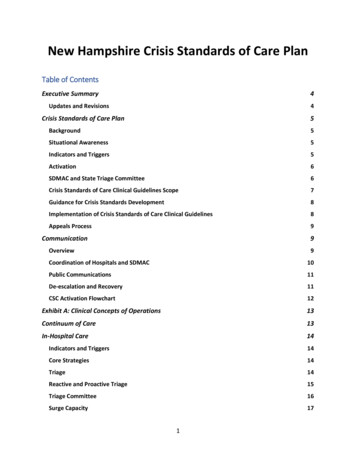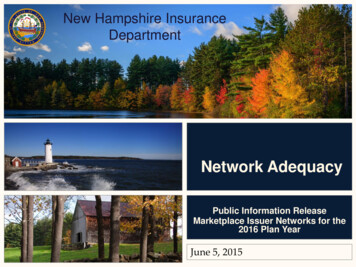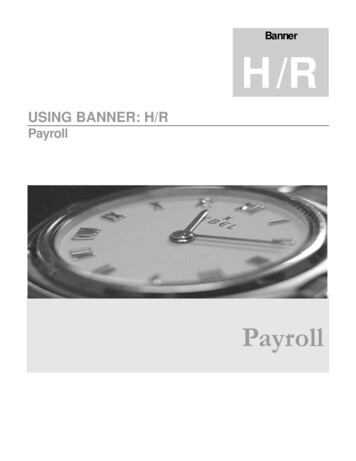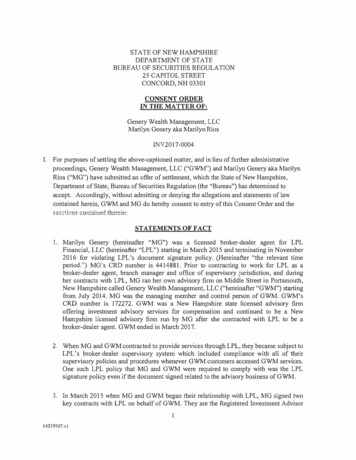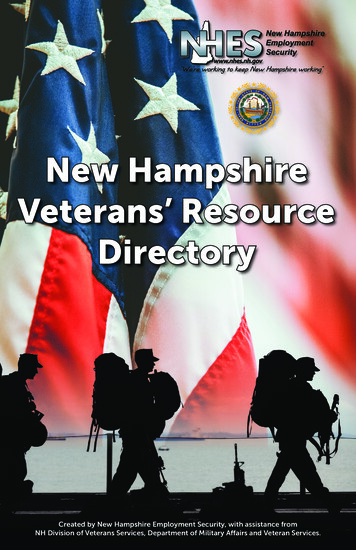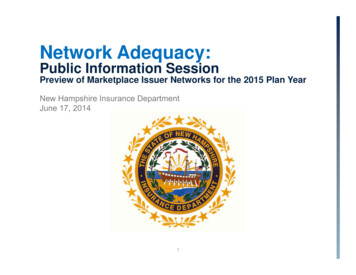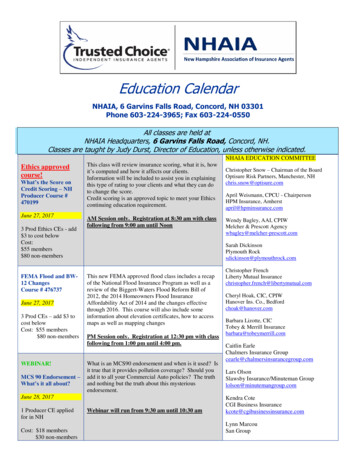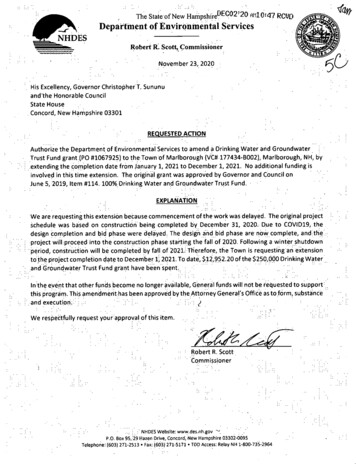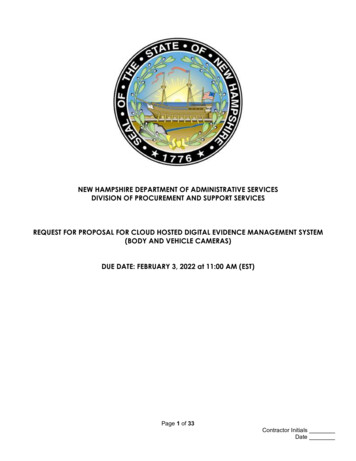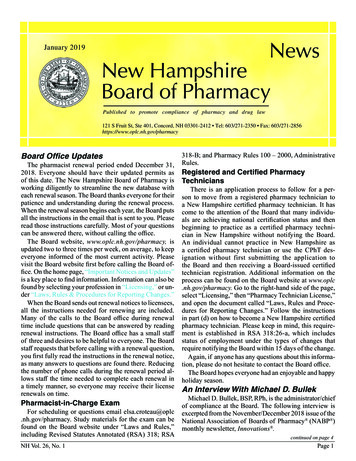
Transcription
NewsJanuary 2019New HampshireBoard of PharmacyPublished to promote compliance of pharmacy and drug law121 S Fruit St, Ste 401, Concord, NH 03301-2412 Tel: 603/271-2350 Fax: 603/271-2856https://www.oplc.nh.gov/pharmacyBoard Office UpdatesThe pharmacist renewal period ended December 31,2018. Everyone should have their updated permits asof this date. The New Hampshire Board of Pharmacy isworking diligently to streamline the new database witheach renewal season. The Board thanks everyone for theirpatience and understanding during the renewal process.When the renewal season begins each year, the Board putsall the instructions in the email that is sent to you. Pleaseread those instructions carefully. Most of your questionscan be answered there, without calling the office.The Board website, www.oplc.nh.gov/pharmacy, isupdated two to three times per week, on average, to keepeveryone informed of the most current activity. Pleasevisit the Board website first before calling the Board office. On the home page, “Important Notices and Updates”is a key place to find information. Information can also befound by selecting your profession in “Licensing,” or under “Laws, Rules & Procedures for Reporting Changes.”When the Board sends out renewal notices to licensees,all the instructions needed for renewing are included.Many of the calls to the Board office during renewaltime include questions that can be answered by readingrenewal instructions. The Board office has a small staffof three and desires to be helpful to everyone. The Boardstaff requests that before calling with a renewal question,you first fully read the instructions in the renewal notice,as many answers to questions are found there. Reducingthe number of phone calls during the renewal period allows staff the time needed to complete each renewal ina timely manner, so everyone may receive their licenserenewals on time.Pharmacist-in-Charge ExamFor scheduling or questions email elsa.croteau@oplc.nh.gov/pharmacy. Study materials for the exam can befound on the Board website under “Laws and Rules,”including Revised Statutes Annotated (RSA) 318; RSANH Vol. 26, No. 1318-B; and Pharmacy Rules 100 – 2000, AdministrativeRules.Registered and Certified PharmacyTechniciansThere is an application process to follow for a person to move from a registered pharmacy technician toa New Hampshire certified pharmacy technician. It hascome to the attention of the Board that many individuals are achieving national certification status and thenbeginning to practice as a certified pharmacy technician in New Hampshire without notifying the Board.An individual cannot practice in New Hampshire asa certified pharmacy technician or use the CPhT designation without first submitting the application tothe Board and then receiving a Board-issued certifiedtechnician registration. Additional information on theprocess can be found on the Board website at www.oplc.nh.gov/pharmacy. Go to the right-hand side of the page,select “Licensing,” then “Pharmacy Technician License,”and open the document called “Laws, Rules and Procedures for Reporting Changes.” Follow the instructionsin part (d) on how to become a New Hampshire certifiedpharmacy technician. Please keep in mind, this requirement is established in RSA 318:26-a, which includesstatus of employment under the types of changes thatrequire notifying the Board within 15 days of the change.Again, if anyone has any questions about this information, please do not hesitate to contact the Board office.The Board hopes everyone had an enjoyable and happyholiday season.An Interview With Michael D. BullekMichael D. Bullek, BSP, RPh, is the administrator/chiefof compliance at the Board. The following interview isexcerpted from the November/December 2018 issue of theNational Association of Boards of Pharmacy (NABP )monthly newsletter, Innovations .continued on page 4Page 1
National Pharmacy Compliance NewsJanuary 2019FOUNDATIONThe applicability of articles in the National Pharmacy Compliance News to aparticular state or jurisdiction can only be ascertained by examining the law ofsuch state or jurisdiction.Final Guidance Documents AddressFDA Policies Related to DSCSATo help ensure that prescription drug products areidentified and traced properly as they move through thesupply chain in compliance with federal law, Food andDrug Administration (FDA) issued two final guidancedocuments related to the Drug Supply Chain Security Act(DSCSA). Released on September 19, 2018, the following final guidance documents will help ensure there areno disruptions in the supply chain as manufacturers andrepackagers include a product identifier on the packageor case. Product Identifier Requirements Under the DrugSupply Chain Security Act – Compliance Policyaddresses industry-wide readiness for implementation of the new requirements aimed at enhancingthe security of the drug supply chain. As the agencycontinues to work with stakeholders to ensure properimplementation of the law, this guidance documentspecifies FDA’s one-year delay in enforcing themanufacturers’ requirement to include a productidentifier on the package or case of products toNovember 27, 2018. Grandfathering Policy for Packages and Homogenous Cases of Product Without a Product Identifieroutlines the circumstances in which packages andcases of product that were in the supply chain beforethe November 2018 product identifier requirementare considered grandfathered. The grandfatheringpolicy describes the circumstances under whichproducts already in the supply chain can remain indistribution without being relabeled with a productidentifier.The final guidance documents can be found at 95.htm.First FDA-Approved Drug ContainingExtract From Cannabis Plant to BePlaced in Schedule VOn September 27, 2018, the United States Departmentof Justice and Drug Enforcement Administration (DEA)announced that Epidiolex – which contains cannabidiol,a chemical constituent of the cannabis plant, and is thefirst FDA-approved drug to contain a purified extractfrom the plant – is being placed in Schedule V of the ConPage 2NABPFNational Association of Boardsof Pharmacy Foundationtrolled Substances Act. FDA approved Epidiolex for thetreatment of seizures associated with two rare and severeforms of epilepsy, Lennox-Gastaut syndrome and Dravetsyndrome, in patients two years of age and older on June25, 2018. Additional information is available in the announcement at ance-act.ASHP Guidelines ProvideRecommendations for PreventingPatient Harm From Medication ErrorsNew guidelines from the American Society of HealthSystem Pharmacists (ASHP) describe opportunities forpharmacists on interprofessional teams to prevent errorsacross the continuum of care in hospitals and health systems. The “ASHP Guidelines on Preventing MedicationErrors in Hospitals” are intended to apply to the acutecare setting because of the special collaborative processesestablished in this setting. However, these guidelines maybe applicable to practice settings outside of the acute caresetting, especially in health systems.Further, the ASHP press release notes that the guidelines address numerous areas in the medication-useprocess where errors may occur, including: patient admission; selection and procurement; storage; ordering,transcribing, and reviewing; preparation; dispensing;administration; monitoring; evaluation; and patientdischarge. Published in the October 1, 2018 issue of theAmerican Journal of Health-System Pharmacy, the guidelines are available at www.ajhp.org/content/75/19/1493.ASHP’s October 2, 2018 press release can be found inthe News section at www.ashp.org.FDA’s Final Guidance DocumentsAddress Compounding andRepackaging of RadiopharmaceuticalsOn September 26, 2018, FDA published the finalguidance titled Compounding and Repackaging of Radiopharmaceuticals by Outsourcing Facilities. In this finalguidance for industry, FDA sets forth its policy regardingcompounding and repackaging of radiopharmaceuticalsfor human use by entities that are registered with FDA asoutsourcing facilities. This guidance describes how FDAgenerally intends to apply section 503B of the FederalFood, Drug, and Cosmetic Act (FD&C Act) to radiopharmaceuticals compounded by outsourcing facilities.
National Pharmacy Compliance NewsIn addition, this guidance describes the conditions underwhich FDA generally does not intend to take action forviolations of certain provisions of the FD&C Act whenan outsourcing facility repackages radiopharmaceuticals,according to the Federal Register notice at .pdf.At the same time, FDA published the final guidancetitled Compounding and Repackaging of Radiopharmaceuticals by State-Licensed Nuclear Pharmacies,Federal Facilities, and Certain Other Entities. Thisguidance sets forth FDA’s policy regarding compounding and repackaging of radiopharmaceuticals for humanuse by state-licensed nuclear pharmacies, federal facilities, and other entities that hold a radioactive materialslicense for medical use issued by the Nuclear RegulatoryCommission or by an Agreement State. Because suchradiopharmaceuticals are not eligible for exemptionsfrom provisions of the FD&C Act related to the production of drugs, FDA is issuing this guidance to describethe conditions under which it generally does not intendto take action for violations of certain provisions of theFD&C Act when these entities compound or repackageradiopharmaceuticals. More details are available in theFederal Register notice at pdf.Pharmacy Toolkit EncouragesConversations With Patients AboutPrescription OpioidsIn collaboration with its pharmacy partners and severalstate pharmacy associations, Allied Against OpioidAbuse (AAOA) developed a Pharmacy Toolkit to helppharmacists engage and educate patients about the safeuse, storage, and disposal of pain medicines. The AAOAPharmacy Toolkit includes resources to help pharmacistsraise awareness among patients about their rights, risks,and responsibilities associated with prescription opioids.These resources include: a pharmacy display, patienthandout, patient engagement guide, tips for talking withpatients and caregivers, prescriber engagement guide,safe storage and disposal training, and social graphics.To learn more about the Pharmacy Toolkit and toobtain these resources, visit AAOA’s website at https://againstopioidabuse.org.Biosimilars Added to FIP’s Policy onPharmacists’ Right to Substitute aMedicationTo account for the emergence of biological medicinesand their biosimilars onto the medical landscape, theInternational Pharmaceutical Federation (FIP) has addedJanuary 2019biosimilars to its policy on pharmacists’ right to substitute one medicine for another. The revised Statement ofPolicy titled “Pharmacist’s authority in pharmaceuticalproduct selection: therapeutic interchange and substitution” includes the core principles of the original statementand the following: generic substitution is recommended as part of thepharmacist’s dispensing role; pharmacists should be provided with bioavailabilitydata by regulatory authorities and manufacturers;and a medicine should only be substituted with a productcontaining a different active ingredient in agreementwith the prescriber.According to FIP’s October 2, 2018 press release, theuse of generic names is still encouraged, but the revisedstatement gives focus to the use of international nonproprietary names. The full Statement of Policy and pressrelease are available at www.fip.org in their respectivesections.FDA Offers CE Course on ReducingHypoglycemic Events in Patients WithType 2 DiabetesFDA is offering a free, one-hour continuing education (CE) course for health care providers (physicians,pharmacists, nurses, and others) about the reduction ofhypoglycemic events in patients with Type 2 diabetes.The course, Leveraging Health Literacy and PatientPreferences to Reduce Hypoglycemic Events in Patientswith Type 2 Diabetes, will describe the prevalence ofhypoglycemic events and identify risk factors leadingto an event. Available for credit through October 31,2020, this course will introduce methods of assessinghealth literacy and numeracy of patients and caregivers;review effective ways to incorporate patient preferences into care plans; and list action steps to reducethe likelihood of a hypoglycemic event for high-riskpatients. To participate in this CE course, visit http://fdapasediabetes.e-paga.com.The FDA Center for Drug Evaluation and Research(CDER) is accredited by the Accreditation Council forPharmacy Education (ACPE) as a provider of continuing pharmacy education (CPE). This program meetsthe criteria for one contact hour (0.1 CEU) of CPEcredit. The ACPE Universal Activity Number for thisknowledge-based activity is 0453-9999-17-449-H01-P.Further, FDA’s CDERLearn in the CDER offers a varietyof learning opportunities, which can be found at 645.htm.Page 3
New Hampshire Board of Pharmacy NewsJanuary 2019continued from page 1How long have you served asadministrator/chief of compliance of the New HampshireBoard of Pharmacy? What wasyour role prior to working withthe Board?I have held the position of administrator/chief of complianceMichael D. Bullekfor one and a half years. Previously, I was a commissioner on the Board for seven yearsand also worked in the retail setting.What is one of the most significant challenges or issuesyour Board addressed in the past year or so?Our Board is responsible for all licensing concerningpharmaceuticals, both in-state companies and companiesthat ship into New Hampshire, the Prescription DrugMonitoring Program (PDMP) and all compliance andinspections involved, and inspecting all providers’ officesfor medication-related issues. Last April, the Board had alegislative audit performed involving the PDMP and ourcompliance unit, verifying our processes to current statutesand rules. We have developed new guidelines, as well asa strategic plan, to move forward on recommendationsstated in the audit.What actions were taken by the Board to address theissue?The Board reviewed and updated all our inspection policies and procedures and started the process of developing software to access our databases to streamline theprocess. We also looked at how the PDMP was operatingand made changes to programs to meet the audit requirements for outcomes management information we send toour providers.What other key issues has the Board been focusing on?The Board has moved to a paperless system, with allpharmacy demographics, licensing, inspection, and investigations performed through the state computer system.What insights do you have for other states that maybe facing similar challenges?New Hampshire is unique in how it has integrated thePDMP into normal Board operations as well as into inspections of providers’ offices to state and federal drug laws.These programs would not be successful without reachingout to various boards and investigators from other states,as well as to NABP, for guidance.Page 4Violations and Inspections – What toExpectViolation notices issued during an inspection are reviewed by the Board during non-public meetings to protectthe reputation of each of the businesses or individuals whoreceived a violation notice per RSA 91-A. Board actionsrelated to a violation notice, or as a result of an investigation related to a complaint, may include dismissal, issuing a letter of concern, issuing an administrative fine, orrequesting an administrative hearing.1. A dismissal occurs when members of the Boardreview a violation or investigation and agree that itdoes not merit further action, so the Board will votefor dismissal and close the file.2. A letter of concern occurs when the Board agreesthat the action is of concern, and that the businessor individual should be notified of that concern.However, it is non-disciplinary. The letter of concernwill be placed in the business’ or individual’s filefor future reference or in the event that additionalinformation becomes known to the Board that warrants it to reopen the case.3. An administrative fine occurs when the Board agreesthat the action rises to a level that warrants discipline.An administrative fine is not reported to the NABPClearinghouse. When a business or individual receives a Board-issued administrative fine, there aretwo actions available to the party:a. Sign a settlement agreement and pay the fine.In this case, the settlement agreement goesinto the party’s file, and the Board will closethe case.b. Contest the fine and request a public hearingbefore the full Board. In this situation, theBoard will issue a notice of hearing, and adate and time for the party to appear beforethe Board so it can hear why the party shouldnot be issued the administrative fine. After thehearing, the Board may elect to dismiss thecase, retain its original decision, or modify theoriginal decision, including notice to NABP.continued on page 5
New Hampshire Board of Pharmacy NewsJanuary 2019continued from page 4The party will be notified of the Board’s decision within 30 days.4. A disciplinary hearing occurs when the Board agreesthat the action rises to a level that warrants disciplinethat requires a hearing. The Board sends the responsible party a notice of hearing that includes whichRSA or Administrative Rules warranted issuing thenotice, along with a date and time to appear beforethe Board. The injured party will appear before theBoard to hear why the Board should not take theproposed action outlined in the notice of hearing.After the hearing, the Board may elect to dismissthe case, retain its original decision, or modify theoriginal decision. In the event that the Board doesnot dismiss the case and elects to retain its decisionor modify the original decision, actions taken willbe sent to NABP. The party will be notified of theBoard’s decision within 30 days.Technician Renewals and CERequirementsThe renewal period for technicians opens on February 1,2019, and closes on March 31, 2019. All registered andcertified technicians will be emailed detailed instructionson how to renew their registrations. The Board asks thatbefore calling with a question, individuals carefully readthe instructions in the notice as most answers to questionscan be found there. A technician cannot practice with aninactive/expired registration. Once inactive, you wouldthen have to follow the reinstatement procedures noted onthe Board’s website to make your registration active again.Certified technicians are included in the automated,random 10% audit of their continuing education (CE).The 2018 audit identified several certified technicians whofailed to comply with the CE requirement and were notifiedby the Board. Individuals identified in 2019’s audit as noncompliant are subject to disciplinary action by the Board.Stay Up to Date on Important News Fromthe BoardAs a reminder to all licensees/registrants, the Boardposts important updates and advisories on its Facebookand Twitter pages. Be sure to follow the Board on theseservices at https://facebook.com/nh.pharmacy.board andhttps://twitter.com/nh pharmacy brd.Additionally, if you ever have questions on any Boardrelated matter, please visit its website at www.oplc.nh.gov/pharmacy, which is updated daily with the latest notices,advisories, and other news from the Board. You can alsocall the Board office at 603/271-2350, Monday throughFriday, between 8 am and 3:30 pm.Page 5 – January 2019The New Hampshire Board of Pharmacy News is published by the New HampshireBoard of Pharmacy and the National Association of Boards of Pharmacy Foundation (NABPF ) to promote compliance of pharmacy and drug law. The opinions and viewsexpressed in this publication do not necessarily reflect the official views, opinions, orpolicies of NABPF or the Board unless expressly so stated.Michael D. Bullek, RPh - Board Administrator/Chief of Compliance &State News EditorCarmen A. Catizone, MS, RPh, DPh - National News Editor & Executive EditorAmy Suhajda - Communications Manager
Oct 01, 2018 · 318-B; and Pharmacy Rules 100 – 2000, Administrative Rules. Registered and Certified Pharmacy . Technicians. There is an application process to follow for a per-son to move from a registered pharmacy technician to a New Hampshire certified pharmacy technician. It h
